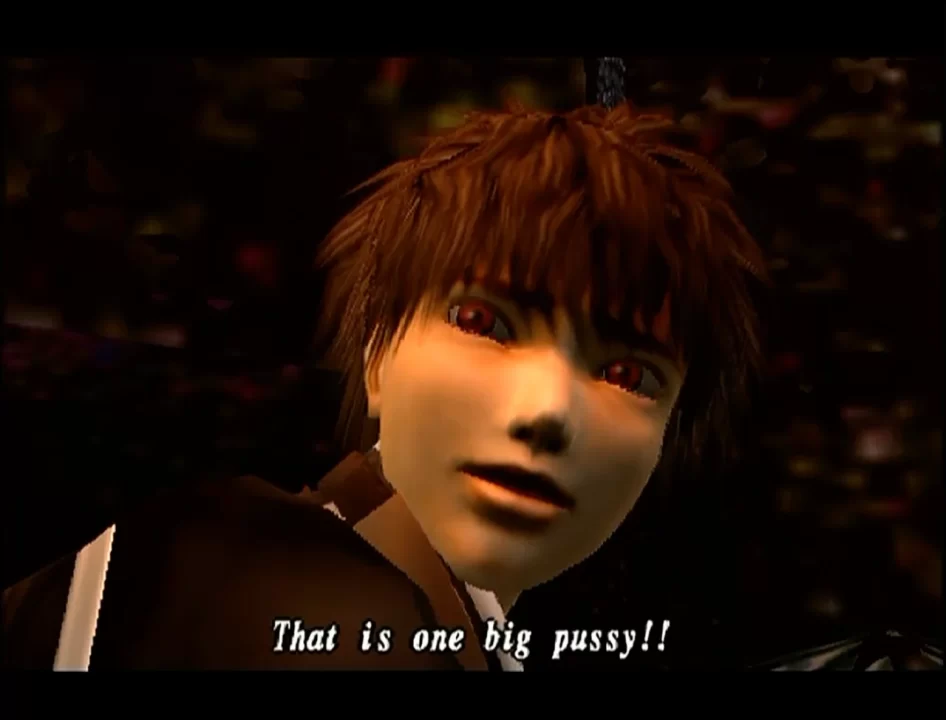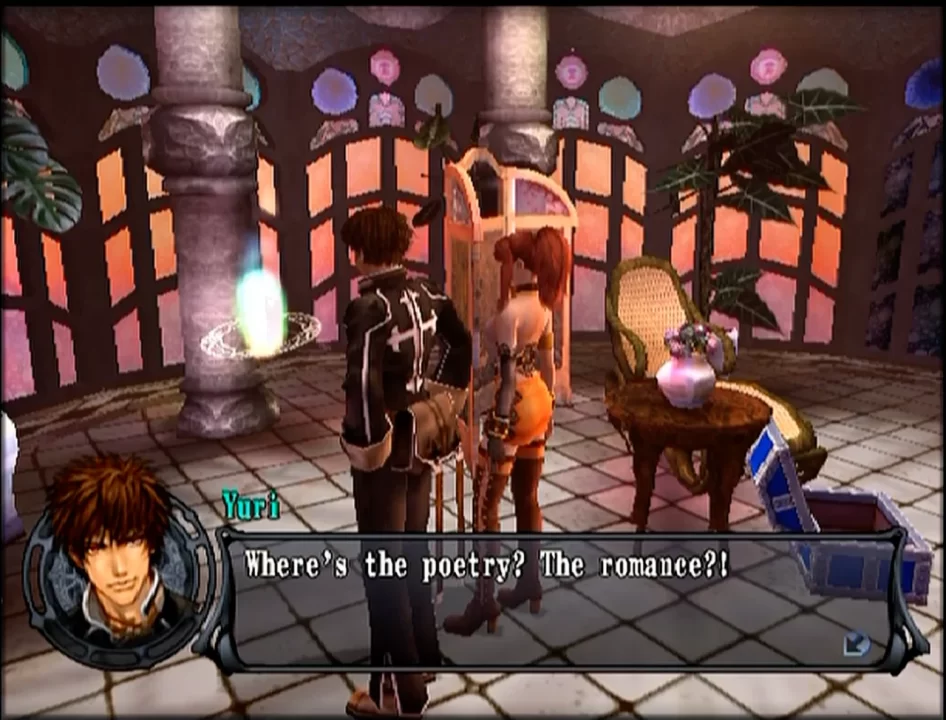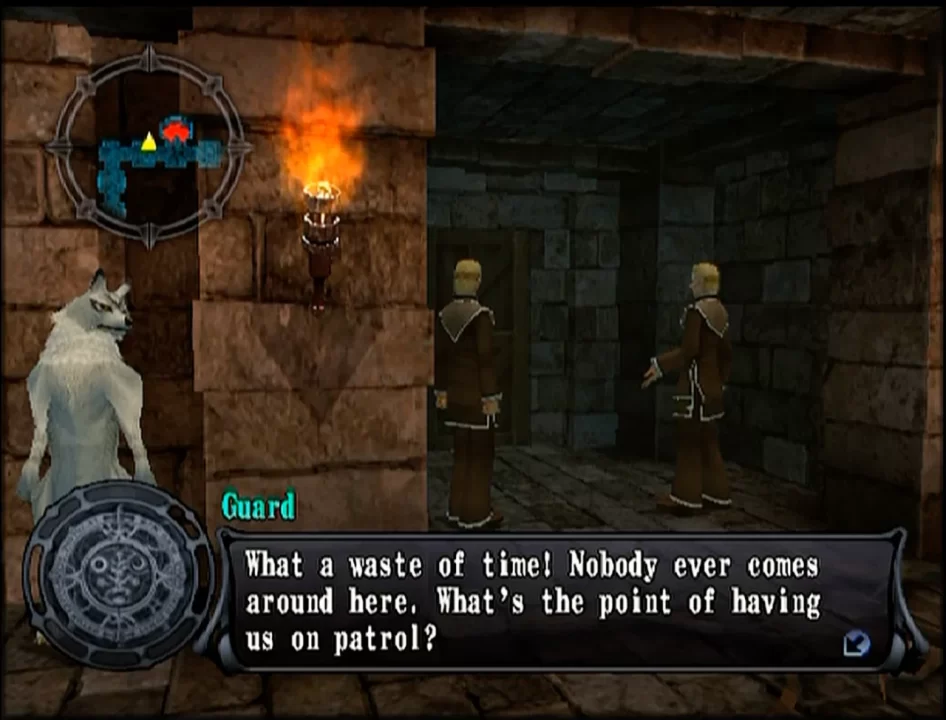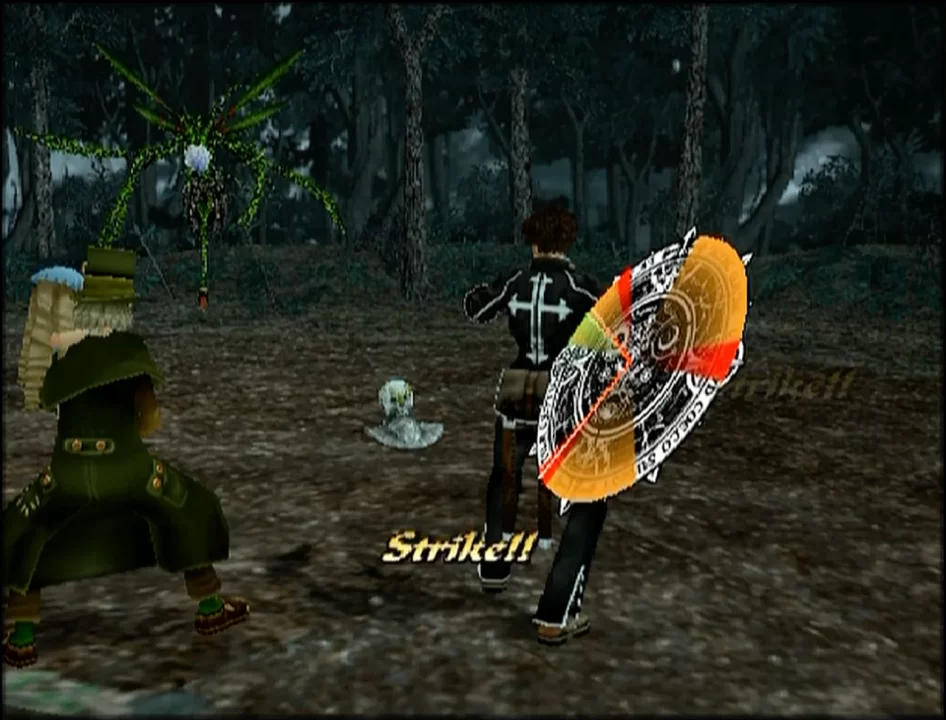(Minor spoiler Warning for the first Shadow Hearts)
For a significant chunk of my life, Shadow Hearts: Covenant has occupied a small but unshakable space in my mind. I was aching to play an obscure RPG of incredible rarity with an unconventional alt-history setting and horror-lite atmosphere, and that feeling persisted well into 2024. Reviewing it was more for the sake of scratching a lifelong itch than anything else.
With that itch finally scratched, I realized that the legendary reputation I had built up for this game was not perfectly congruent with my play experience. I suppose, in some ways, this could be considered disappointment, but it was probably inevitable given how long I ruminated about someday playing it. In the end, I can still declare that if you’re lucky enough to track it down, Covenant is a weird but also very worthwhile investment.
The game’s hero is once again Yuri Hyuga, the god-slaying protagonist of the first Shadow Hearts. Following the previous installment’s bad ending, Covenant finds Yuri defending a French village from the German Army during World War I, which earns him the attention of a mysterious organization. They soon find and attack him with a magic artifact that curses him and seals his ability to transform into a cornucopia of different demons. Now, Yuri finds himself on the run alongside Karin Koenig, a defecting German officer incensed by her allies’ willingness to kill civilians; Blanca, a proud white wolf; and Gepetto, a creepy old puppeteer who I wish wasn’t in this game. More allies join the party at a steady pace, including pro-wrestling vampire Joachim, dancer Lucia, Russian royal Anastasia Romonov, and taciturn samurai Kurando.
While the eclectic cast can certainly be entertaining, the story they take part in is wildly uneven. At best, there’s some half-decent political intrigue and thematic work in the second half concerning how most human conflict is based around a borderline futile search for personal happiness. There are even some great individual moments with genuine heart and fun cameos from real-world figures. However, a huge chunk of the first half is dedicated to the party simply trying to find the series’ resident exposition dumper Roger Bacon to find out what they should be doing, followed by an arc where they’re put up against mad monk Grigori Rasputin, who doesn’t have much going for him as a villain.
Even when the second half offers an intriguing shift in antagonist that will shock you if you played the first game, it still feels undercooked. Yuri is the only party member with significant emotional stakes in the plot, and it’s difficult to discern why some characters even tag along with him beyond a vague sense of camaraderie. Even Karin, the heroine, largely exists just to fruitlessly long for Yuri and catalyze one of the most unintentionally hilarious plot twists I have ever had the pleasure of witnessing. It all feels like a rough draft, not helped by the spotty voice acting, stilted writing, and subtitles that often fail to match the dialogue. Those subtitles are also off by default, so you can miss some of Blanca’s “dialogue” if you don’t realize subtitles are available. While (apparently) the Japan-exclusive Director’s Cut adds some much-appreciated scenes to flesh out certain characters, what little I could find in English didn’t meaningfully change my impression of them.
That said, the party does flourish when they’re allowed to let loose and be goofy. There’s a lot of laughs to be had when everyone is hanging out and talking to each other about something other than the main plot. Yuri is especially refreshing in how dismissive he is toward most of the game’s absolute madness. One of my favorite sideplots involves Yuri and Karin meeting with the Soul of the Judgment Ring to receive upgrades, only for Yuri to poke fun at him, learn that he’s a beleaguered family man, and ultimately befriend him.
That’s far from the goofiest thing that happens, especially if you decide to do all the sidequests. Blanca’s Wolf Bout tournament, helping a fortress full of ghosts rest in peace, and scouring the game’s many optional dungeons are only a few examples of its side content. While they’re mostly devoid of strong narrative beats, almost every sidequest features some degree of delightfully bizarre comedy, though not all of them hit the mark. Joachim’s “Man Festival” could be less tedious and have far fewer gay and Indian stereotypes, but that’s thankfully a minor portion of the game. And most optional content isn’t missable, so you don’t need to constantly consult a guide to see everything on offer.
It’s not all fun and laughs, though; Shadow Hearts and its predecessor, Koudelka, are known for their distinct aesthetics, and this is another area where the game excels. The character models and their animations are a much-needed step up from the first, but the crowning achievement is the environments. While Covenant features a variety of real-world cities with a very welcoming ambiance, this serves to contrast the true star: the lovingly tenebrous dungeons that see the party navigating caves, catacombs, and several other horror-tinged locales. Those dungeons even have some legitimately challenging puzzles, though with how large and labyrinthine they are, it’s often tedious to navigate them. The music compliments this atmosphere in the field and in combat, the best songs being the battle tracks that use distorted vocals to drive home the surreal atmosphere and creature designs. And while we’re mentioning battle, it’s time to examine Covenant‘s biggest triumph.
Actions in battle rely on the Judgment Ring, a system where the player must hit marked nodes in order to attack, use items, or perform almost any action. Hitting a red “strike zone” enhances the effects of the command. This might seem repetitive at first, and in the first Shadow Hearts, that was often the case. But Covenant has changed the game entirely. In fact, I will stake out a claim that its version of the Judgment Ring is one of the most well-realized RPG battle mechanics to ever grace the genre.
There’s incredible variety in how players can customize the Ring: increasing the number of hits in one attack in exchange for smaller hit zones, finding collectibles to make hit and strike zones larger, and cycling between ring type options that drastically alter how it functions. Some of these options were limited to weapon customization in the first game, and there was almost no reason to engage with it until you had everyone’s best gear. Now, it simultaneously offers the player risky attack options, a built-in difficulty modulator, and a gold mine for challenge runs with a genuinely stunning level of elegance.
And that’s just the first example in a laundry list of combat improvements. Character animations are now fluid and natural, creating a satisfying verve to encounters. A major gameplay addition is the combo system, where characters can be set up to chain moves with one another for increased damage and an explosive finisher if the combo is long enough. Certain moves affect enemy positioning, others are more effective depending on the enemy’s position, and the player still must hit all their Judgment Rings. It’s addictive enough that even when it ends up making the combat somewhat easy, the thought the player needs to put into combos still makes them satisfying to perform.
The addition of magic crests to freely swap between characters also gives them more options than the limited skill selection in the first game. Unique character gimmicks like Yuri’s various demon fusions, Anastasia’s ability to copy skills from enemies, Joachim’s rotating transformations, or Lucia’s various oil mixtures flesh out this system even more. Not every character has idiosyncrasies this unique, but having some conventional options to offset the wild cards is still welcome.
The one bad thing about combat is that by the endgame the sheer volume of fights you take part in gets pretty grating, especially if you do the sidequests. It’s easy to end up overequipped for any situation and have more than enough money to buy expansions to your hit and strike zones. This isn’t a fatal flaw, but I think that enemies with more challenging AI, attack patterns, or even just a bit more health could remedy it. It would also be nice to have some more movement options in battle, considering how large a role positioning now plays. As it is now though, it’s still very enjoyable.
And that’s what Shadow Hearts: Covenant ends up being: very enjoyable in spite of its faults. Even if I didn’t connect with the story, it does have its moments, and the sheer girth of content and exemplary Judgment Ring customization make it something truly special. It’s a unique experience, and though its rarity might be a barrier, anyone who has the opportunity to play this game should seize it.






